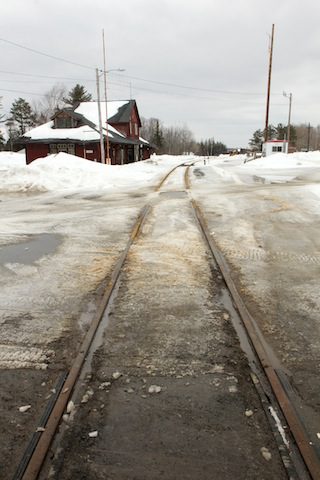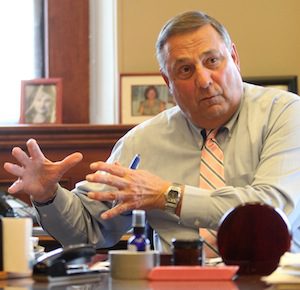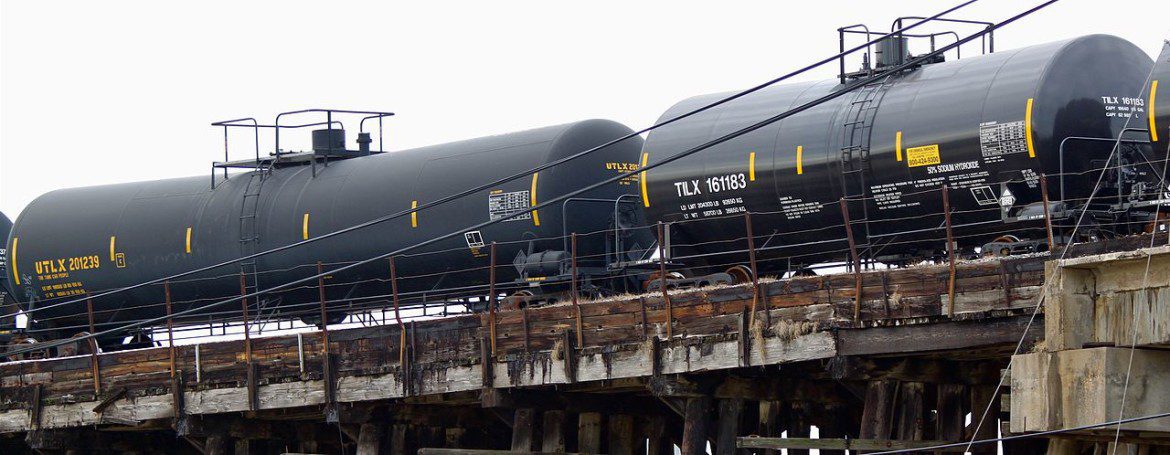After a runaway oil train killed 47 people in Lac-Mégantic, Quebec, just miles from the Maine border in 2013, the Maine public demanded to know more about the railways here.
How much oil was moving through Maine? Which companies shipped it and along what routes? Was the government doing enough to keep communities safe?
At about the same time, the rail industry began its own campaign to keep much of that information secret, according to interviews and correspondence with regulators.
Those efforts paid off last year when state officials – who for years had reported the volumes of monthly crude oil shipments – abruptly stopped providing them to the public in October.
The new law that gagged them not only blocked the public’s right to know what dangers lurked on the train tracks, but its passage followed a haphazard process in which lawmakers repeatedly ignored red flags and safeguards designed to prioritize the public’s right-to-know over private business interests.

The bill, An Act Regarding the Confidentiality of Railroad Carrier Cargo, passed into law with no debate and over a forceful veto from Gov. LePage. Its sponsor, former Rep. Mike Shaw, D-Standish, had sold it as a commonsense compromise: If state officials promised to make confidential shipments of hazardous materials, he said, then railroads — who had argued such details could be used by competitors to undercut their business — would volunteer to share them.
“I thought it would facilitate communication between first responders and the railroads,” Shaw said, four months after the bill took effect.
But the spare, 80-word exemption did not require railroads to share information with local first responders. Instead, it simply forced the state to keep those details secret from the public.
“When people are aware of what’s coming through their community, they pay attention,” said Bob Klotz, a spokesman for 350 Maine, an activist group that has protested oil-by-rail cargoes in the state. “To take that information away is very concerning.”
Flawed Process
Shaw’s legislation marked the 460th exception to Maine’s 40-year old Freedom of Access Act.
The act requires any effort to hide government information from the public to conform with a series of minimum requirements. But the normal legislative process, which includes reviewing a 12-point checklist to ensure each requirement is met, was not followed in this case, according to an examination by the Maine Center for Public Interest Reporting.
“I don’t have that piece of paper and can’t document that we actually did it,” said Peggy Reinsch, the legislative analyst who worked on the bill, referring to the checklist.
Among the problems the Center identified:
- Private business interests must “substantially outweigh” the public’s right-to-know in order for lawmakers to amend the state’s open records act. Yet legislators failed to seek out opposing views, relying instead on industry lobbyists, railroad companies and Shaw’s own testimony, committee records show. First Amendment experts, environmentalists and state and federal railroad regulators were never consulted, leaving lawmakers with only half the story.
- Shaw’s written testimony implied secrecy was the only way to ensure railroads provided first responders with details about hazardous materials. But federal regulators already required railroads report large shipments of crude oil — among the most controversial of hazardous materials — and top U.S. Dept. of Transportation officials had encouraged states to disclose that information. In an interview after the bill took effect, Shaw acknowledged: “I didn’t really know any of those details when I went into this.”
- Shaw pitched his bill as a proposal to “increase safety,” but federal regulators, including the Department of Homeland Security, had already vetted the risks and were unconvinced. “The Department finds no basis to conclude that the public disclosure of the information is detrimental to transportation safety,” stated a notice published in the Federal Register in October 2014. Lawmakers in Maine never discussed the notice, the culmination of a two-year-long national discussion of railroad safety.
- Shaw said disclosing information about trains carrying hazardous materials like crude oil put railroads at a “serious competitive disadvantage,” a claim reiterated by industry lobbyists but unsupported by evidence, according to federal regulators and the courts. The U.S. Department of Transportation had already determined information about oil shipments was not “commercially-sensitive.”
- Shaw is a conductor for the passenger railroad Amtrak, according to income disclosure filings. While ethics laws in Maine would not have stopped Shaw from presenting the bill, the co-chairman of the Judiciary Committee reviewing the bill expressed reservations about Shaw’s closeness to the industry. “I sensed a little bit of conflict of interest there,” said Sen. David Burns, R-Whiting.
- The final check and balance in the law-making process was lost amid the most contentious legislative session in recent memory. Gov. LePage, who vetoed the bill alongside more than 100 others, warned lawmakers: “If trains are carrying hazardous materials through our State … then this information needs to be available to our citizens.”
As Maine goes…
Though not an oil producer, Maine had been among the largest exporting states in the nation. It’s a transit point between the oil fields of western North America and the 300,000-barrel-per-day Irving oil refinery in neighboring Saint John, New Brunswick, one of New England’s largest suppliers of gasoline.

As shipments spiked nationally, citizens demanded more information but railroads increasingly lobbied to give them less, citing security risks and the need to keep the information from competitors.
Though the Maine Department of Environmental Protection had made public summary information on many hazardous materials shipped by rail — all of it now off-limits to the public — oil dominated the railroad’s agenda.
Just 12 days after the 2013 Lac-Mégantic accident, while fires still smoldered in the city’s flattened downtown, Pan Am Railways sent a letter to the DEP requesting the state keep records of crude shipments confidential.
Two weeks later, Melanie Loyzim, then-director of the state DEP’s Bureau of Remediation and Waste Management, told Pan Am vice president Cynthia Scarano that Maine’s attorney general found no basis for hiding the information from the public.
“Therefore, it appears that legislative action would be required to make such information confidential based on security concerns,” Loyzim said in a letter dated Aug. 2, 2013.
The next year, Shaw said a public safety officer from Pan Am approached him at work and raised the issue of keeping some records confidential.
By then, oil shipments through Maine had dropped off sharply, a result of market forces, and Pan Am was the only railway moving small amounts of crude through Maine.
Shaw, who understood the ins and outs of the rail business, liked the idea and submitted a bill.
At a public hearing, Pan Am’s Scarano told the legislature’s Judiciary Committee that state emergency workers were increasingly asking for more details about shipments of hazardous materials and reiterated her point that secrecy would allow her company to “freely share information that will benefit emergency responders and the people of Maine.”
The committee’s research staff sought the advice of the Association of American Railroads, a Washington, D.C-based lobby group, according to a review of committee files, but state and federal regulators were never consulted.
“It went under the radar and all of a sudden, it was passed,” said David Madore, a Department of Environmental Protection (DEP) spokesman in December. “It was not something we were involved in.”

The legislation’s only real opposition came from Gov. LePage, who at the time was issuing vetoes at a record pace and chiding lawmakers for “hastily passing bills they haven’t even read.”
Yet LePage’s veto of Shaw’s bill differed from the others.
If first responders have information about hazardous cargo moving in Maine, LePage reasoned, it suggests, at least, the possibility of danger. He added, “I am not at all comfortable shielding this information from the Maine citizens that may be placed in harm’s way by these transports.”
LePage’s veto was overridden in both the House (146-1) and the Senate (31-4).
Right to know?
Today, Maine residents can no longer know for sure if train cars laden with volatile crude oil are passing through their communities or standing on nearby sidetracks for hours and days at a time.
“Without some information about what railroads are actually doing, how can the public judge whether regulations are protective of human health and the environment?” said Sigmund Schutz, a First Amendment attorney from Portland. “Ultimately, this type of thing undermines people’s confidence in government.”
Some lawmakers and legislative staff, in retrospect, agree the process was flawed.

Sen. Burns, the Judiciary committee co-chairman, acknowledged lawmakers may not have had all the information they needed. “We saw this as a safety issue, more than an effort to hide things,” said Burns. “If we need to put a change in, we can do that.”
Rep. Barry Hobbins (D-Saco), the committee’s other co-chairman, did not respond to repeated requests for comment.
For his part, Rep. Shaw, who resigned from the legislature in August for personal reasons, says he would encourage his former colleagues to put in “some tweaks” so that some information, like total volumes of crude oil passing through Maine, once again would be made public.
“Keeping them confidential was really never my intention,” said Shaw.







